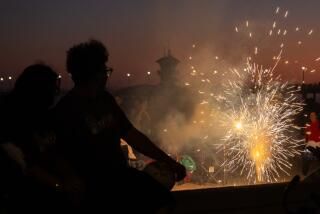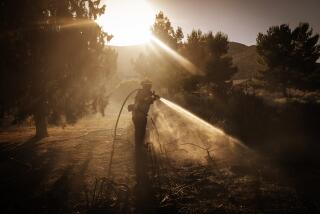Pollution still shrouds its moment in the sun
- Share via
BEIJING — Despite removing 1.5 million cars from the roads, shutting down hundreds of factories and construction sites and bringing much of the city’s economic life to a standstill, Beijing remains stubbornly shrouded in a persistent, gray haze on the eve of the Summer Olympics.
The poor air quality just 11 days before the opening ceremonies has left Chinese government officials scrambling for explanations that include statistical anomalies and the 90-plus-degree heat.
The state-run China Daily reported Monday that the Chinese government may be forced to implement an “emergency plan” if air quality hasn’t improved 48 hours before the Games begin Aug. 8. One possible measure would expand the recently implemented system that allows cars on the road only on odd or even days, depending on license plate numbers, to a ban of up to 90% of private traffic.
“Beijing’s air quality is not up to what the world is expecting from an Olympic host city; the sports teams have reason to be concerned,” said Lo Sze Ping, Greenpeace’s campaign director in Beijing, during a news conference Monday. He blamed the bad air on what he characterized as a “develop first, clean up later” approach by the Chinese government.
“It is not good enough,” Lo said.
Beijing’s pre-Olympic clampdown on pollution has already seriously crimped economic life in the capital region. Along with the license-plate-based restrictions that took effect July 20, the city has banned many out-of-town cars and trucks from its streets and suspended all construction work. Factories up to hundreds of miles away have been closed.
But the air quality levels haven’t improved at all and for the last few days have been worse.
Even over the weekend when traffic was at a minimum, the air pollution level around the Olympic stadium fell into a category that the Chinese government terms “unhealthful for sensitive groups,” with inhalable particulates at two to three times the standard set by the World Health Organization. On Monday, air pollution was barely within the “acceptable” level.
Beijing calculates its daily air pollution index from 1 to 500 based on measures of four pollutants. Days on which the index is under 100 are said to be acceptable. The Chinese government says air quality has greatly improved since 2001, when Beijing won its bid to host the Games with promises to clean up the local atmosphere. Since then, Beijing has tightened emissions standards, built four new subway lines and spent a reported $16 billion on air quality improvement.
“Indeed we have reached our commitment to make sure air quality is satisfactory for the Games,” Beijing environmental protection official Du Shaozhong told reporters Saturday. So far this year, he said, 70% of days had acceptable levels of pollution, an increase of 20 percentage points over last year.
But Steven Q. Andrews, a U.S. environmental consultant who analyzed Beijing’s figures, contends that the Chinese have tweaked the data. He notes that two air monitoring stations in congested parts of downtown have been dropped from the government’s calculations for the air pollution index, while monitors in the outskirts have been added.
The Chinese government also fails to measure ground-level ozone, a major component of smog. And it calculates inhalable particulate matter using a largely discredited measurement that looks primarily at larger particles, rather than the tiny particles more damaging to lungs.
“They are manipulating the way they measure and what they measure so much that you cannot say the air quality is improving,” Andrews said. “But their insistence that air quality has improved takes the pressure off of local officials and factory owners to run emissions control technology and do what they really need to do.”
Beijing’s pollution woes are a product of both geography and its booming economy. The city sits in a basin surrounded by three mountains that trap pollutants. In addition, the number of automobiles here has roughly doubled since 2001.
In theory, the odd-even license plate system would ban half of Beijing’s 3.3 million cars from the roads on any given day. The real impact is more complicated. In a city where many companies have fleets of cars, they simply use those whose license plates correspond to the day.
Furthermore, Beijing has set aside two of the Second Ring Road’s six lanes for exclusive use by Olympic VIPs, creating greater traffic jams on the city’s most important thoroughfare. With so many cars spewing fumes while idling in traffic, parts of the city are suffering from even worse-than-normal exhaust.
But many Beijing residents resent the foreign focus on their air. Under the best of circumstances, they say, blue skies are rare here this time of year, the rainy season in most of Asia. With air quality the main small talk in town, there are frequent spats between Beijingers and visitors about whether the problem is wuran, pollution, or just mai, haze.
Chinese environmental officials argue that poor visibility does not always mean the air is bad to breathe.
“You might not be able to see things in a steamy bathroom, but you would not necessarily say it is pollution,” Du told reporters.
Whatever the cause, there is little dispute that Beijing’s air in recent days has been unpleasant and certainly not a photogenic backdrop for television crews arriving from around the world. Beijing’s showcase architecture -- part of China’s $43-billion investment in the Olympics -- looks ghostly under the veil of haze.
Athletes have warned that they will wear masks to protect their lungs while in Beijing, possibly even while competing. And several Olympic teams are conducting their pre-Olympic training in Japan and South Korea to minimize exposure to the host city’s air.
The Chinese government has already said its scientists have been devising a way to artificially induce rainstorms to clear the air before the opening ceremonies.
But Chinese environmentalists worry less about the Olympics than they do the aftermath. They fear that, once the Olympic moment passes, authorities will lose the political will to take tougher measures.
“Beijing has missed a golden opportunity to use the Olympics as a platform for more ambitious programs to clean up the air,” said Lo of Greenpeace.
--
--
(BEGIN TEXT OF INFOBOX)
Unhealthful air
Since winning its bid to host the 2008 Olympic Games, China has struggled to reduce Beijing’s air pollution.
Levels of particulate matter (measured in 2004) for Summer Olympics host cities since 1980*
(in micrograms per cubic meter)
Beijing: 89
Athens: 43
Seoul: 41
Barcelona: 35
Los Angeles: 34
Moscow: 21
Sydney: 20
*Average annual concentrations in residential areas
Note: Data for Atlanta (1996) is unavailable.
Source: The World Bank
More to Read
Go beyond the scoreboard
Get the latest on L.A.'s teams in the daily Sports Report newsletter.
You may occasionally receive promotional content from the Los Angeles Times.






